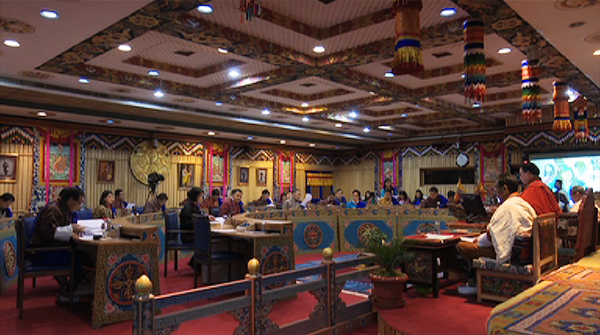 The National Council’s Social and Cultural Affairs Committee introduced the Lhengye Zhungtshog Bill of Kingdom of Bhutan 2020 today. The new Bill will now repeal the Lhengye Zhungtshog Act of 1999.
The National Council’s Social and Cultural Affairs Committee introduced the Lhengye Zhungtshog Bill of Kingdom of Bhutan 2020 today. The new Bill will now repeal the Lhengye Zhungtshog Act of 1999.
Once the Bill becomes Act, it will help to set out the procedures for the formation and composition, powers, responsibilities and functions of the Lhengye Zhungtshog. It will also aid in preserving and enhancing the public’s confidence and trust. The House after its 22nd session of the National Council and during the 11th plenary session assigned the Social and Cultural Affairs Committee to review the present Lhengye Zhungtshog Act.
“The present Lhengye Zhungtshog Act is enacted before the Constitution. And it is found that the most sections in the existing Act contradict with the Constitution and other relevant laws. Moreover, the National Law Review Taskforce also found the Act redundant and recommended to repeal. On top of that, the Lhengye Zhungtshog being the highest executive institution requires a separate Act like any other institution for guidance and convenience while executing its duties and powers,” informed Ugyen Namgay, the Vice Chairperson of the Social and Cultural Affairs Committee of the National Council.
While deliberating the Bill, some members raised their concerns on the committee’s section 10 regarding eligibility and qualification. Samtse and Gasa’s Members of the Parliament (MP) said it is important to set comprehensive and specific criteria on experiences and qualification to be appointed as cabinet ministers.
“I support the committee’s clause. However, it is important to have an additional criteria especially age limit and work experiences. It would help in smooth functioning of the ruling government,” said Tirtha Man Rai, the Samtse MP.
“It is not easy to be the head of any ministry. If one of the ministries fail its duty, it will have an adverse effect on our economy and it will affect the progress of other ministries. I have referred some countries’ criteria for ministers that follow Cabinet Acts. For Thailand, one has to attain a minimum of 35 years to be a Minister. And in Singapore, an elected member has to serve as a deputy minister before becoming full-fledged Minister,” added Dorji Khandu, the Gasa MP.
However, some members are against the set criteria for age and experiences to qualify as a Minister.
“The Lhengye Zhungtsho Bill has to be forwarded to the National Assembly. We have only 47 constituencies and it would be difficult with the set criterion for age and work experiences. For instance, if there is a minimal difference from electoral process, we cannot conduct re-election to get competent minister candidates,” said Sangay Dorji, the Chhukha MP.
“It is unwise to set criteria for ministers because we cannot predict the results of elections. We cannot guaranty one’s result based on his or her experiences and qualifications. As said by Chhukha’s MP, if all the elected candidates fall below 30 years, it would be difficult to get experienced minister candidates to govern the country,” added Jigme Wangchuk, the Deputy Chairperson of National Council.
Meanwhile, most of the members supported the committee’s stand. The committee’s vice-chairperson said the section is set based on the Election Act, the National Assembly Act, the Constitution and other relevant laws.
The House will continue its deliberation on the Bill tomorrow. The Bill will be forwarded to the National Assembly during its Summer session.
Pema Tshewang












